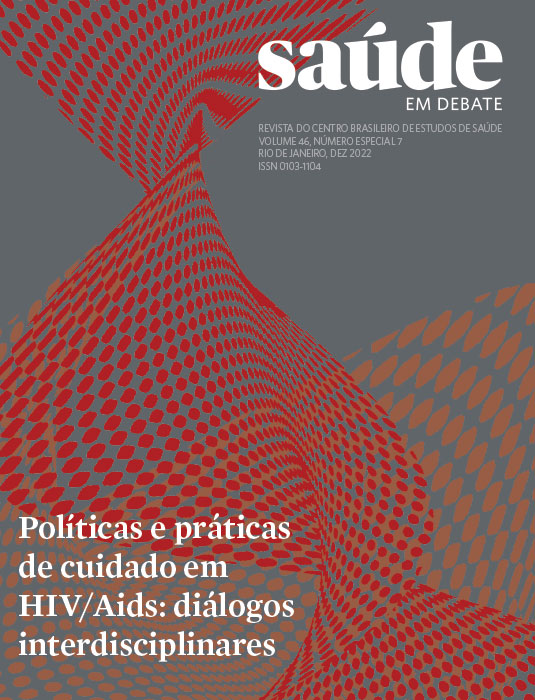Vol. 46 No. especial 7 dez (2022): HIV/AIDS care policies and practices: interdisciplinary dialogues

With great pleasure, the journal 'Saúde em Debate' launches its special 'Christmas' issue HIV/AIDS care policies and practices: interdisciplinary dialogues, taking the opportunity to wish its collaborators (reviewers, editors, authors, revisers and translators) a 2023 with renewed hopes and full of Universal, Comprehensive, Equitable and Democratic Health. And here's to more editorial achievements!
Excerpts from the Presentation of the special issue signed by the scientific editors: “The publication we have in our hands resulted from the meeting of a group of researchers and health professionals from various teaching and research institutions with the objective of knowing, gathering, and making visible academic research and analysis of experiences on HIV/AIDS care in the current context. [...] we thought of a set of questions that we hoped to address through the publication of this issue: What is care in HIV/AIDS? In what spaces is care produced? Which actors are part of this construct? How has HIV/AIDS care been produced in different Brazilian contexts? How does it relate to people’s access to health networks and services? What social markers and axes of analysis are important in an analysis of care in HIV/AIDS? (Gender? Sexual identity and orientation? Class? Color/race/ethnicity? Religion? Age? Body? Sexuality? Technology? Management? Work processes? Others?) What/how do policies entail HIV/AIDS care? How do the experiences of people/subjects/individuals/users/patients articulate themselves in these threads? [...] It is appropriate to register that we started the production of this thematic issue in a moment of threat to democracy and science, and that this project, with all the developments it has had, including the production of this collection, has fed us and contributed to our daily resistances for many times. We finalize the process after the presidential elections that elected Luiz Inácio Lula da Silva President of the Republic, and in this current conjuncture we place hope and expectations for more investments in the health area, in the resumption of the participation of organized civil society, in the resources for universities, in the production of knowledge driven to the reconstruction and resumption of the sanitary reform project. To publish it in the journal of the Brazilian Center for Health Studies (CEBES) is, for us, a reason for immense joy.”
Topics addressed: primary and specialized care in a context of decentralization of services for HIV/AIDS; People Living With HIV/AIDS in Primary Health Care in the city of Rio de Janeiro; AIDS and prevention: social projects with young people in Rio de Janeiro; Sexuality, sociability, work, and HIV prevention among vulnerable populations during the COVID-19 pandemic; suffering of women living with HIV; men with homosexual practices and HIV prevention in the Recife Metropolitan Region; sisterhood among travestis e and transgender women in accessing health care and HIV prevention; Sexual politics and HIV/AIDS activism: the experience of Loka de Efavirenz; Young women born with HIV: communication of seropositivity to partners; Frontline health professionals’ perceptions about HIV and youth; : questioning the discourses in the offer of Post-Exposure Prophylaxis (PEP); Post-sexual Exposure Prophylaxis in the Unified Health System: possible cares in HIV prevention; instrument to assess the care for prisoners living with HIV/AIDS; HIV/AIDS care policies and practices; prevention in the 5th decade of the epidemic; Biopolitical government of AIDS: the homosexuality as a social dangerousness; children and young people living with HIV/AIDS; Chronicity of living with HIV/AIDS in childhood, adolescence, and youth; Reports on a book with situations of stigma/discrimination of People Living With HIV/AIDS in Brazil; HIV/AIDS Policies, Activism, and Anthropology: A talk with Richard Parker.



















